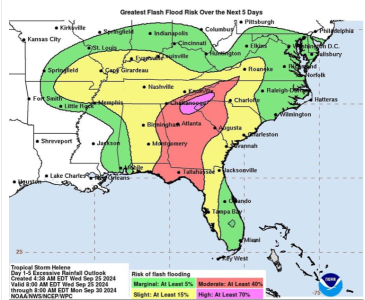NotUrsula
DIS Legend
- Joined
- Apr 19, 2002
- Messages
- 20,090
I wouldn't say that at all. The terrain is very different in this instance.The response has been slower than Katrina. Where’s the outrage this time?
In the case of Katrina, the storm itself was not the real disaster; the collapse of the levee was, and that happened nearly a full day after the storm had passed. Some responders who had been posted nearby actually were getting ready to turn for home because they thought they would not be needed. The thing is, the post-Katrina flood happened in a bowl; a large, open, low-lying area where boats and army trucks could roll in easily, where there was no downhill rush of water sweeping buildings off foundations and piling trees up on top of other buildings, and where huge numbers of functional boats were already available nearby, so once the order was given, they came in fast. With the exception of the twin-span, roads into New Orleans were simply underwater, not destroyed, so they were passable as soon as the water receded.
In the Carolinas you are dealing with mountain terrain, millions of downed trees, and washed-out roads. There is no body of water comparable to the Missississipi River or Lake Ponchartrain via which boats can launch. There are small rivers so covered with debris that they look like dry land, but they just are not; so the route is impossible via boat and equally impossible via land vehicle. Air is all there is until temporary roads can be cleared and built, and air is slow unless you're parachuting truck-sized pallets out of the back of a moving cargo plane. Aid was sent immediately, but much of it is stuck in staging areas waiting for scarce specialized vehicles that can move it into the affected areas.

